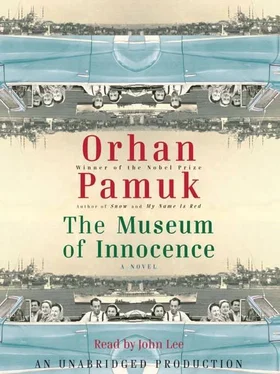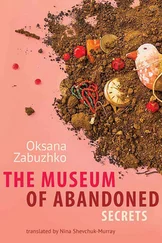I was most preoccupied by such anxieties during my first visits to Çukurcuma, when I was still getting used to the house, Füsun’s regular presence, and the domestic routines. I hoped that Füsun would know from the way I looked into her eyes that I was trying to say, Here I am. This was my chief sentiment during my first visit. For the first few minutes after my arrival, I congratulated myself on conquering my shame and disquiet to be there. After all, if it made me this happy to be near Füsun, then why should I make such a fuss over my visits? And here was Füsun, smiling sweetly, as if there was nothing unusual about my being there, as if she was truly happy I had come.
What a pity that we only rarely found ourselves alone during those first visits. Still, I seized every opportunity to whisper things like “I’ve missed you terribly!” or “It seems I’ve missed you terribly!” and Füsun would answer, if only with her eyes, seeming to say that she had warmed to my words. There was no possibility of getting any closer than that.
For the sake of any readers who are amazed that I could visit Füsun and her family (it seems so clinical to call them the Keskins) for eight years, and who wonder how I can speak so breezily about such a long interval-thousands of days-I would like to say a few words about the illusion that is time, as there is one sort of time we can call our own, and another-shall we call it “official” time?-that we share with all others. It is important to elaborate this distinction, first to gain the respect of those readers who might think me a strange, obsessed, and even frightening person, on account of my having spent eight lovelorn years trudging in and out of Füsun’s house, but also to describe what life was like in that household.
Let me begin with the big clock on the wall: It was German-made, cased in wood and glass, with a pendulum and a chime. It hung on the wall right next to the door, and it was there not to measure time, but to be a constant reminder to the whole family of time’s continuity, and to bear witness to the “official” world outside. Because television had taken over the job of keeping time in recent years, and did so more entertainingly than did the radio, this clock (like hundreds of thousands of other wall clocks in Istanbul) was losing its importance.
Wall clocks first came into fashion in Istanbul at the end of the nineteenth century, when Westernized pashas and wealthy non-Muslims began to furnish their homes with large wall clocks much more ornate than these, with weights and pendulums and winders. In the early years of the twentieth century, and after the founding of the Republic, when the country was aspiring westward, such clocks rapidly gained favor with the city’s middle classes. There was a clock like this in my own home when I was a child, and all the other houses that were then part of my life had identical or even larger ones, with even more exquisite woodwork, and by and large you would find them in the entryway or the hall, though people hardly looked at them, since by the 1950s “everyone,” even children, had wristwatches, and each house had a radio that was always playing. Until television sets came to dominate the sound track of domesticity, changing the way people ate, drank, and sat-until the mid-1970s, when our story begins-these wall clocks continued to tick away, as they had done for so long, even though the householders scarcely paid them any attention. In our house you could not hear the ticking or the chimes on the hour and half hour if you were in the sitting room or any of the bedrooms, so the clock never disturbed us. And so for years no one even thought about stopping the clock, and one would indeed continue to stand on chairs to wind it! Some nights, when out of love for Füsun I had drunk a great deal, and misery awoke me, and I arose from my bed to go to have a cigarette in the sitting room, I would hear the clock in the corridor chiming the hour, and it would warm my heart.
In Füsun’s house there were times when the clock was ticking and times when it had stopped: It was during the first month that I noticed this difference, and I grew accustomed to it at once. Late in the evening we’d be sitting together watching a Turkish film or a seductive chanteuse crooning an old song, or something about ancient Rome with gladiators and lions, which we’d tuned in to halfway through, and which had such bad subtitles, or such bad dubbing, that we’d immediately begin to joke about it until we could barely follow the action, and were each left to drift off into his own dreams-just then a moment would arrive when by some enchantment a silence would envelop the television set, and the clock hanging right next to the door, whose existence we’d forgotten, would begin to chime. One of us-usually Aunt Nesibe, and sometimes Füsun, too-would turn to the clock with a meaningful look, and Tarık Bey would say, “Who wound it up again, I wonder?”
Sometimes the clock was wound, and sometimes it was forgotten. Even when it had been wound and was ticking away, the chime would remain silent for months at a time; sometimes it would chime only once, on the half hour; sometimes it would surrender to the ambient silence and let weeks pass before it made another sound. That was when I’d realize, as a chill passed through me, how frightening everything must be when no one was home. Whether or not it was ticking, whether or not the chime sounded, no one looked at the clock to know the time, but they did spend a lot of time talking about whether it had been wound or not, and about how a frozen pendulum might be set in motion again just by touching it once. “Let it be, let it tick, it’s not hurting anyone,” Tarık Bey would sometimes say to his wife. “It reminds us that this house is a house.” I think I would agree, as would Füsun, Feridun, and even the odd visitor. So the wall clock was not there to remind us of the time, or to warn us that things were changing; it was there to persuade us that nothing whatsoever had changed.
During those first months I dared not even dream that nothing would or could change-that I would spend eight years eating supper in Çukurcuma, watching television, and chatting amiably without purpose. During my first visits every word Füsun uttered, every feeling that registered on her face, the way she paced up and down the room-all of it seemed new and different to me, and whether the clock was ticking or not, I paid it no mind. What mattered was to be at the same table with her, to watch her, to feel happy and remain perfectly still as my ghost left my body to kiss her.
Even without our being aware of it, the clock always ticked in the same way, and when we sat at the table, eating our supper, it brought us the peace of knowing we hadn’t changed, that all would stay the same with us. That the clock served to make us forget the time, even as it continually brought us back to the present, reminding us of our relations with others-this paradox was the cause of the cold war that flared up from time to time between Aunt Nesibe and Tarık Bey. “Who wound that clock again, to wake us in the middle of the night?” said Aunt Nesibe, if during a silence she noticed that the clock was working again. “If it wasn’t ticking, it would feel as if there was something missing in this house,” said Tarık Bey one windy evening in December 1979. He added, “It used to chime in the other house, too.” “So then, are you trying to tell me you still haven’t become accustomed to Çukurcuma, Tarık Bey?” said Aunt Nesibe, with a much gentler smile than her words implied (she sometimes addressed her husband with the honorific “Bey”).
Such measured quips, aspersions, and perfectly timed digs-the couple had honed their craft over many years, and whenever we heard the clock’s tick at an unexpected moment or the gong began to chime, the discord would become more intense. “You wound this clock so that I wouldn’t get any sleep either, Tarık Bey,” Aunt Nesibe would say. “Füsun, dear, could you make it stop?” If you used your finger to still the pendulum in the middle, then no matter how much someone had wound it, the clock would stop, but Füsun would only smile and look at her father; sometimes Tarık Bey would give her a look that meant, All right then, go ahead and stop it! and sometimes he would stubbornly refuse. “I didn’t touch it. The clock started on its own, so let it stop itself!” he’d say. Sometimes, when they saw that such mysterious pronouncements made an impression on the neighbors or the children who came to visit on rare occasions, Tarık Bey and Aunt Nesibe would begin an argument of double entendres. “The djinns have got our clock working again,” Aunt Nesibe would say. “Don’t touch it, you could get hurt,” Tarık Bey would say in a menacing voice as he frowned. “I don’t care if there’s a djinn ticking inside it,” Aunt Nesibe would reply. “I just don’t want it waking me up at night like a drunken church bell ringer who can’t tell morning from night.” “Don’t fret so, and, anyway, if you forget the time you’ll feel better,” Tarık Bey would say. Here he was using “time” to mean “the modern world” or “the age in which we live.” This “time” was an ever-changing thing, and with the help of the clock’s perpetual ticking, we tried to keep it at bay.
Читать дальше












